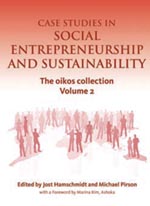Case Studies in Social Entrepreneurship and Sustainability
 |

Case Studies in Social Entrepreneurship and Sustainability. The oikos case collection Volume 2.
Edited by: Jost Hamschmidt and Michael Pirson
Published by : Sheffield UK: Greenleaf Publishing
Published in: 2011;
452 pages

Book Reviewed By: Dr. Susan Mueller,
University of St. Gallen
|
There are several key strengths of the case collection. First, the quality of the case studies is consistently impressive. The case studies are well written and thoroughly researched. They provide a wealth of additional information to illustrate the scope of the problem (e.g., fatalities caused by a problem), state of the company involved (e.g., annual statements), the look-and-feel of the product (e.g., pictures of the product), or the response to the solution in social media (e.g., quotes from a weblog). Additionally, detailed teaching notes are available for the case studies. For example, the teaching note for Better Place includes background information of relevant concepts (e.g., environmental sustainability as a source of business opportunities, disruptive technology innovation, social entrepreneurship) as well as suggestions for pre-classroom assignments, classroom discussion, and follow-up assignments. |
|
Second, the case studies make it easy to put oneself in the shoes of the protagonists. For example, in the first case "So you want to be a social entrepreneur", Cynthia Koenig, a young American woman, is trying to juggle a full-time job, a part-time MBA and a promising social business that sells a tool called "WaterWheel". The "WaterWheel" makes water collection and transportation less challenging for people living in rural areas. It will be easy for students to see themselves in a similar situation if they started to pursue a social entrepreneurship idea while they are still working in their "traditional" job. Also, most cases describe what triggered the entrepreneur to pursue his or her idea and how it was put into action as the venture developed.
Third, I believe that the case studies are highly relevant due to the topics addressed by the social entrepreneurs. Poverty reduction, healthcare for the poor, and safe drinking water, to mention a few, are three of the biggest challenges the world community is currently facing. The core focus of the case collection is on approaches for tackling water challenges. I believe it is a wisely chosen topic. Unsafe drinking water is one of the biggest health issues leading to thousands of preventable deaths every day due to water-borne diseases such as diarrhea. Mitigating water problems has an immediate impact on the lives of people: It significantly decreases health risks and frees villagers, especially women, from spending large parts of their time finding water.